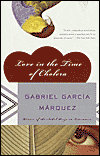
Dr Juvenal Urbino, most distinguished physician along the Caribbean coast, illustrious for civic achievements and artistic patronage, died aged eighty-one-and-a-half of a broken spine when he fell from the branch of a mango tree as he tried to catch a parrot.
His widow, the once breath-taking Fermina Daza, was enraged at the emptiness which lay before her. She instinctively recoiled from the one hand extended to steady and comfort her - a hand which for her long life had always been within reach but which, in her haughtiness and guilt, she would not acknowledge: the hand of Florentino Ariza.
For his part, Ariza's desolate vigil of devotion had begun half a century before, on Fermina's afternoons of embroidery under the almond trees in Los Evangelio's park. His secret obsession had led him into an enigmatic existence and shadowy social reputation despite his renown in business. In the city consecrated to the cult of the Holy Spirit, one Pentecost, love found a new tongue with which to speak.
In a novel unequalled since his masterpiece One Hundred Years of Solitude, Marquez tells a love story which will haunt and inspire his readers for generations.
I don't know what it is about Marquez's writing. It isn't easy, but it is oh so rewarding.
His style is one of a wanderer. The storyline moves backwards and forwards through time in a meandering fashion, almost as though the author is mortally afraid of following a straight line, and yet the story moves steadily forward. Marquez is also a known master of magical realism, and there is plenty of that within this novel, along with laugh out loud humour. For example, at one point we learn that Fernanda and her husband had not spoken for several months because they were having a fight about whether or not there was soap in the shower - a completely inane thing to be fighting about, but portrayed in such a way that it was possible to believe that it could be real - as real as when dealing with larger issues such as infidelity.
In this book, the story is really a love story...a grand passion that lasts for decades and decades, despite the fact that it is unrequited for most of that time.
I did find it somewhat amazing that by the end of the book I still felt compassion for the main characters, especially Ariza, because he was a far from likeable man. Or maybe there was just one episode that made me feel that he was unlikeable.
This is the kind of novel that makes it possible to believe in impossible love and of sailing into the sunset with the one that you love! It is also the kind of novel that you know you will find new things in each time that you read it! Really, really enjoyable.
Rating 4.5/5
Other Blogger's Thoughts:
Chris @ Book-a-Rama
Things Mean a Lot







This one is my second favourite Garcia Marquez, right after Chronicle of a Death Foretold. I wonder if it feels the same way in English as it does in Spanish?
ReplyDeleteI haven't read Chronicle of a Death Foretold. I have read 100 Years and Of Love and Other Demons, both of which I enjoyed!
ReplyDeleteI also enjoyed this book and 100 Years is one of my favourites. You wrote a great review!
ReplyDeleteI've never been a fan of Marquez but the writing is indeed great.
ReplyDelete::sigh:: Garcia Marquez. I love his writing. I've even gotten my mom hooked on him.
ReplyDeleteI always wonder if he tells a story as well as he writes one, and if he would be a fascinating dinner companion.
::off to pull out my copy of 100 Years::